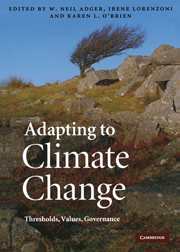Book contents
- Frontmatter
- Contents
- List of contributors
- Preface
- 1 Adaptation now
- Part I Adapting to thresholds in physical and ecological systems
- Part II The role of values and culture in adaptation
- 9 The past, the present and some possible futures of adaptation
- 10 Do values subjectively define the limits to climate change adaptation?
- 11 Conceptual and practical barriers to adaptation: vulnerability and responses to heat waves in the UK
- 12 Values and cost–benefit analysis: economic efficiency criteria in adaptation
- 13 Hidden costs and disparate uncertainties: trade-offs in approaches to climate policy
- 14 Community-based adaptation and culture in theory and practice
- 15 Exploring the invisibility of local knowledge in decision-making: the Boscastle Harbour flood disaster
- 16 Adaptation and conflict within fisheries: insights for living with climate change
- 17 Exploring cultural dimensions of adaptation to climate change
- 18 Adapting to an uncertain climate on the Great Plains: testing hypotheses on historical populations
- 19 Climate change and adaptive human migration: lessons from rural North America
- Part III Governance, knowledge and technologies for adaptation
- 31 Conclusions: Transforming the world
- Index
- References
18 - Adapting to an uncertain climate on the Great Plains: testing hypotheses on historical populations
Published online by Cambridge University Press: 31 August 2009
- Frontmatter
- Contents
- List of contributors
- Preface
- 1 Adaptation now
- Part I Adapting to thresholds in physical and ecological systems
- Part II The role of values and culture in adaptation
- 9 The past, the present and some possible futures of adaptation
- 10 Do values subjectively define the limits to climate change adaptation?
- 11 Conceptual and practical barriers to adaptation: vulnerability and responses to heat waves in the UK
- 12 Values and cost–benefit analysis: economic efficiency criteria in adaptation
- 13 Hidden costs and disparate uncertainties: trade-offs in approaches to climate policy
- 14 Community-based adaptation and culture in theory and practice
- 15 Exploring the invisibility of local knowledge in decision-making: the Boscastle Harbour flood disaster
- 16 Adaptation and conflict within fisheries: insights for living with climate change
- 17 Exploring cultural dimensions of adaptation to climate change
- 18 Adapting to an uncertain climate on the Great Plains: testing hypotheses on historical populations
- 19 Climate change and adaptive human migration: lessons from rural North America
- Part III Governance, knowledge and technologies for adaptation
- 31 Conclusions: Transforming the world
- Index
- References
Summary
Theoretical context
We begin this chapter with two questions: first, how do people adapt to climate uncertainty? Second, can the historical past serve as a laboratory for testing and understanding human responses to climate uncertainty? We examine these questions in the context of a study of adaptation to climate variability in a county in the northern Great Plains of the United States during and after its initial agricultural settlement in the late nineteenth century. The purpose of the study is to understand how a newly arrived population of European immigrants and European-origin settlers from the Eastern United States adapted to the harsh and uncertain climate conditions on the Great Plains. But rather than constructing a historical narrative on how climate influenced the settlement experience, we will instead examine current theory on decision-making related to adaptation to climate uncertainty and study how the settlement experience in the Great Plains can illuminate and contribute to this body of theory.
There is a large body of research on decision-making that can be related to human adaptation to uncertainty. It deals with such topics as the need for predictability and control, overconfidence in judgements, the role of available or recent and thus easily predictable models in anticipating future events, risk communication and management, and others (Weber, 2006; Marx et al., 2007). Here, however, we will focus specifically on three aspects of the corpus of research on decision-making under uncertainty: (a) patterns of information processing; (b) the finite pool of worry; and (c) the bias toward a single action in response to uncertainty.
- Type
- Chapter
- Information
- Adapting to Climate ChangeThresholds, Values, Governance, pp. 283 - 295Publisher: Cambridge University PressPrint publication year: 2009
References
- 1
- Cited by



